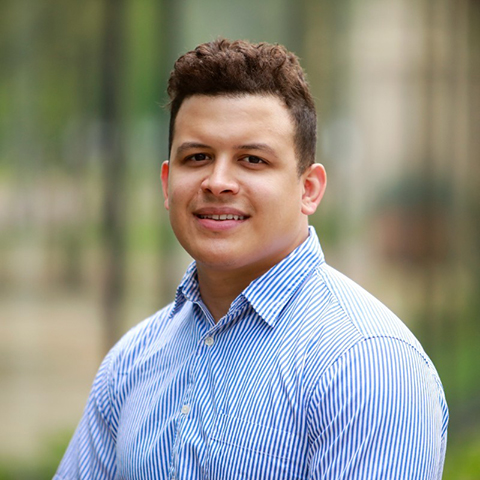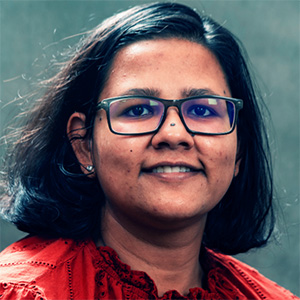
MOSAIC scholar explores enzymes
Edwin Alfonzo grew up in Lawrence, Massachusetts, immersed in the vibrant music and dance culture of his Caribbean family roots, and inspired toward a life in science.
“Growing up, I had two amazing teachers who sparked my interest in chemistry and math,” Alfonzo said. “Their dedication to engaging students and investing in me started my scientific journey.”

That journey led to his current position as a National Institutes of Health Ruth L. Kirschstein National Research Service Award postdoctoral fellow at the California Institute of Technology and his place in the latest cohort of the American Society for Biochemistry and Molecular Biology Maximizing Opportunities for Scientific and Academic Independent Careers, or MOSAIC, program.
Alfonzo pursued his B.S. in chemistry and mathematics at the University of Massachusetts Lowell, where he developed a fascination with organic chemistry — exploring the structure, properties and reactions of carbon-containing compounds, which have extensive applications in medicine, agriculture and energy production.
Determined to earn a Ph.D., Alfonzo joined the laboratory of Aaron B. Beeler at Boston University. His research focused on synthesizing lignan natural products — secondary plant metabolites with diverse biological properties. This work led to successful total syntheses of all members found in lignans, resulting in molecules that can potentially benefit human health. One example is podophyllotoxin derivatives, which can be used to treat various forms of cancer.
“I realized that Nature’s machinery for molecular assembly, enzymes, was far superior at making the types of bonds that organic chemists are interested in,” Alfonzo said.
This prompted his transition from organic chemistry to protein engineering. He now works as a postdoctoral fellow in Nobel laureate Frances H. Arnold’s research group at Caltech, where he engineers enzymes to perform new-to-nature reactions.
“My postdoc advisor is a pioneer in her field,” Alfonzo said, “and we use innovative methods in the lab to direct the evolution of enzymes.”
Alfonzo discovered the MOSAIC Scholars program through social media and was impressed by the supportive community of previous scholars. Excited about the opportunity to receive scientific and career mentorship, he applied.
“Having diverse opinions and perspectives to guide career decisions is always helpful,” Alfonzo said. “I haven’t had many mentors before in my life, and MOSAIC offered the perfect opportunity to find a new mentor.”
As Alfonzo prepares to apply for faculty positions, he is also honing his grant writing, science communication and networking skills through the MOSAIC program.
In his own lab, Alfonzo aspires to study how enzymes can perform new functions. He also strongly advocates diversity in science, recognizing its crucial role in driving innovation and groundbreaking discoveries. As a part of the WAVE fellows program at Caltech, Edwin has trained undergraduate students from diverse backgrounds. He also volunteers to introduce young students to science to foster diversity and inclusivity in STEM.
“My message to the younger generation is always to pursue your passions because you will never get bored, and you will give it your all,” Alfonzo said, and this has been his mantra throughout his scientific journey.
Outside the lab, Alfonzo enjoys working out, dancing, cooking and, most of all, leading the Arnold lab’s softball team, affectionately known at Caltech as “error-prone,” to victory.
Enjoy reading ASBMB Today?
Become a member to receive the print edition four times a year and the digital edition monthly.
Learn moreGet the latest from ASBMB Today
Enter your email address, and we’ll send you a weekly email with recent articles, interviews and more.
Latest in People
People highlights or most popular articles

Simcox wins SACNAS mentorship award
She was recognized for her sustained excellence in mentorship and was honored at SACNAS’ 2025 National Conference.

From humble beginnings to unlocking lysosomal secrets
Monther Abu–Remaileh will receive the ASBMB’s 2026 Walter A. Shaw Young Investigator Award in Lipid Research at the ASBMB Annual Meeting, March 7-10 in Washington, D.C.

Chemistry meets biology to thwart parasites
Margaret Phillips will receive the Alice and C. C. Wang Award in Molecular Parasitology at the ASBMB Annual Meeting, March 7-10 in Washington, D.C.

ASBMB announces 2026 JBC/Tabor awardees
The seven awardees are first authors of outstanding papers published in 2025 in the Journal of Biological Chemistry.

Decoding how bacteria flip host’s molecular switches
Kim Orth will receive the Earl and Thressa Stadtman Distinguished Scientists Award at the ASBMB Annual Meeting, March 7–10, just outside of Washington, D.C.

Thiam elected to EMBO
He was recognized during the EMBO Members’ Meeting in Heidelberg, Germany, in October.

